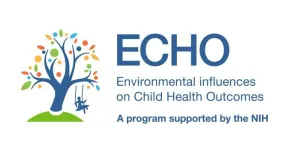(Press-News.org) Eating any amount of fish during pregnancy was associated with about a 20% lower likelihood of autism spectrum disorder (ASD) diagnosis, particularly in females, and a slight reduction in autism-related traits in offspring, according to a new study funded by the Environmental influences on Child Health Outcomes (ECHO) Program at the National Institutes of Health.
However, researchers did not find the same association with supplements containing omega-3 fatty acids.
Fish is an important source of omega-3 fatty acids, an essential nutrient during pregnancy for supporting maternal health and child neurodevelopment. A recent analysis of ECHO Cohort data revealed that about 25% of the pregnant participants reported never eating fish or consuming it less than once a month during their pregnancy. Even fewer participants reported taking omega-3 fish oil supplements.
ECHO Cohort researchers wanted to see whether low fish consumption and omega-3 supplement use during pregnancy might be associated with the occurrence of an autism diagnosis or parent-reported autism-related traits.
“Our study contributes to a growing body of evidence that demonstrates the role that prenatal diet can play in autism-related outcomes in offspring,” said ECHO Cohort researcher Emily Oken, MD, MPH, of Harvard Medical School.
Dr. Oken said the findings underscored the need for better public health messaging about guidelines for fish consumption for pregnant people, considering the low fish intake in the U.S. and the rising diagnoses of autism.
What happened during the study?
Researchers analyzed data from about 4,000 participants, examining the relationships among fish intake, supplement use, and neurodevelopmental outcomes related to autism.
Fish consumption and omega-3 supplement use were measured with dietary information reported by participants. Participants’ fish consumption was categorized as less than once a month, more than once a month but less than weekly, weekly, and two or more servings per week. About 20% of adult participants reported no fish intake, and most reported not using omega-3 or fish oil supplements.
The researchers then looked at the relationship between maternal fish intake and omega-3 fish oil supplement use during pregnancy and the occurrence of clinician-diagnosed autism and parent-reported autism-related traits. These traits were measured using the Social Responsiveness Scale (SRS), a widely used survey completed by parents or caregivers. Higher scores on the SRS indicate the presence of more autism-related behaviors.
Consuming fish during pregnancy was associated with a lower likelihood of offspring being diagnosed with autism and a slight decrease in total SRS scores compared to not eating fish. These results were consistent across all levels of fish consumption, from "any" amount or "less than once per week" to "more than twice per week." No significant associations were found between omega-3 fish oil supplements and autism diagnosis compared to no use.
Experts recommend that people consume additional omega-3 fatty acids during pregnancy. Prenatal fish intake is a key source of omega-3 fatty acids that are critical for fetal brain development. However, fish and omega-3 fatty acid supplementation in the U.S. is low.
“This study provides yet more evidence for the safety and benefit of regular fish consumption during pregnancy,” said Dr. Oken. “Other proven benefits include lower risk for preterm birth and improved cognitive development.”
Dr. Oken led this collaborative research published in the American Journal of Clinical Nutrition.
Oken, E. & Lyall, K. (2024) Association of maternal fish consumption and ω-3 supplement use during pregnancy with child autism-related outcomes: results from a cohort consortium analysis. American Journal of Clinical Nutrition. 10.1016/j.ajcnut.2024.06.013
###
About ECHO: Launched in 2016, the Environmental influences on Child Health Outcomes (ECHO) Program is a research program in the Office of the Director at the NIH with the mission to enhance the health of children for generations to come. ECHO investigators study the effects of a broad range of early environmental influences on child health and development. For more information, visit echochildren.org.
About the NIH: NIH, the nation’s medical research agency, includes 27 Institutes and Centers and is a component of the U.S. Department of Health and Human Services. NIH is the primary federal agency conducting and supporting basic, clinical, and translational medical research, and is investigating the causes, treatments, and cures for both common and rare diseases. For more information, visit www.nih.gov.
END
ANN ARBOR, Mich. – Leaders at three Michigan hospitals aiming to address equity issues for pediatric patients wanted to start with inspecting data key to identifying potential inequities.
What they learned: much of those data are inaccurate.
A study from the Michigan Child Health Equity Collaborative, or Mi-CHEC, found substantial errors across the three health systems in racial and ethnic designations in their electronic medical records. Accuracy of these designations are important to clinical care improvement ...
PHILADELPHIA— Taking the weight loss medication semaglutide did not increase the risk of depressive symptoms, suicidal thoughts, or suicidal behavior in persons without known major mental health disorders, according to a new study led by researchers from the Perelman School of Medicine at the University of Pennsylvania published this week in JAMA Internal Medicine. Both the Food and Drug Administration (FDA) and the European Medicines Agency are actively monitoring the psychiatric safety of semaglutide and similar medications after post marketing surveillance reports of depression, suicidal thoughts (ideation), ...
About The Study: This cohort study, including mostly patients with type 2 diabetes, does not show an association between use of glucagon-like peptide-1 (GLP-1) receptor agonists and an increased risk of suicide death, self-harm, or incident depression and anxiety-related disorders.
Corresponding Author: To contact the corresponding author, Peter Ueda, MD, PhD, email peter.ueda@ki.se.
To access the embargoed study: Visit our For The Media website at this link https://media.jamanetwork.com/
(doi:10.1001/jamainternmed.2024.4369)
Editor’s ...
About The Study: The results of this post hoc analysis suggest that treatment with semaglutide, 2.4 mg, did not increase the risk of developing symptoms of depression or suicidal ideation/behavior vs placebo and was associated with a small but statistically significant reduction in depressive symptoms (not considered clinically meaningful). People with obesity should be monitored for mental health concerns so they can receive appropriate support and care.
Corresponding Author: To contact the corresponding author, Thomas A. Wadden, PhD, email wadden@pennmedicine.upenn.edu.
To access the embargoed study: Visit our For The Media website at this link https://media.jamanetwork.com/
(doi:10.1001/jamainternmed.2024.4346)
Editor’s ...
Large study included 47,307 well-child visits at 30 clinics in Michigan and Colorado
Almost 50% of clinicians receiving a prompt plus added support delivered a secure firearm storage program during well visits versus just 22% of doctors receiving prompt only
Firearm-related injuries are the leading cause of death for young people in the U.S.
‘We can save lives’ with a brief program to support parents in secure storage
CHICAGO --- If it takes a pediatrician less than one minute per visit to talk to parents about how to securely store their firearms and offer a free cable lock, why do only 2% of doctors report routinely doing so?
Turns out, they ...
There has been concern that common diabetes drugs could increase the risk of suicide and self-harm. In a new study, led by researchers at Karolinska Institutet and published in Jama Internal Medicine, no such risk increase was observed.
Drugs of the type GLP-1 analogues lower blood sugar levels and are used by millions of people worldwide. They are mainly used to treat diabetes, but drugs such as Ozempic have also been shown to be effective against obesity, which has increased their popularity.
At the same time, both American and European drug authorities have warned that there may be risks associated with ...
An invasive, freshwater jellyfish is popping up in B.C. waters in the thousands and future sightings could increase rapidly, according to UBC research.
The peach blossom jellyfish clones have been spotted in 34 places in B.C., its furthest northern range in North America, and a recent paper predicts sightings and the number of locations will increase by the end of the decade as climate change extends this range.
Dr. Florian Lüskow, who completed the research during his postdoctoral fellowship ...
A new study using 10 years of data has provided the most comprehensive estimate of infertility rates to date in a threatened wild animal population
Researchers from the University of Sheffield found infertility accounts for 17 per cent of hatching failure in an endangered songbird, the hihi, with the majority of hatching failure being caused by embryo death
This is the first study to find a link between small population size, sex ratio bias, and reduced fertilisation rates in wild animals
By considering the impacts of population size and sex ratio on fertility, conservationists can better manage the numbers and composition of animals in populations ...
Each agency representative presented the status of their current involvement in current and future planning for missions to Apophis (including extended mission for OSIRIS-REx, renamed OSIRIS-APEX, for NASA and the RAMSES mission for ESA) as well as the existing partnerships and mutual involvement in other agency’s missions, e.g. the infrared camera provided by JAXA in ESA’s mission Hera. Concepts to fly to Apophis, as well as reuse of existing payloads, spare parts and hardware, coordination of arrival time at Apophis of the different spacecraft, techniques to be demonstrated, ...
OAK BROOK, Ill. – Researchers evaluating the performance of ChatGPT-4 Vision found that the model performed well on text-based radiology exam questions but struggled to answer image-related questions accurately. The study’s results were published today in Radiology, a journal of the Radiological Society of North America (RSNA).
Chat GPT-4 Vision is the first version of the large language model that can interpret both text and images.
“ChatGPT-4 has shown promise for assisting radiologists in tasks such as simplifying patient-facing radiology reports and identifying ...






